Dark Spot Correctors So Good, No One Will Believe You Ever Had Hyperpigmentation
Even, radiant skin coming right up.
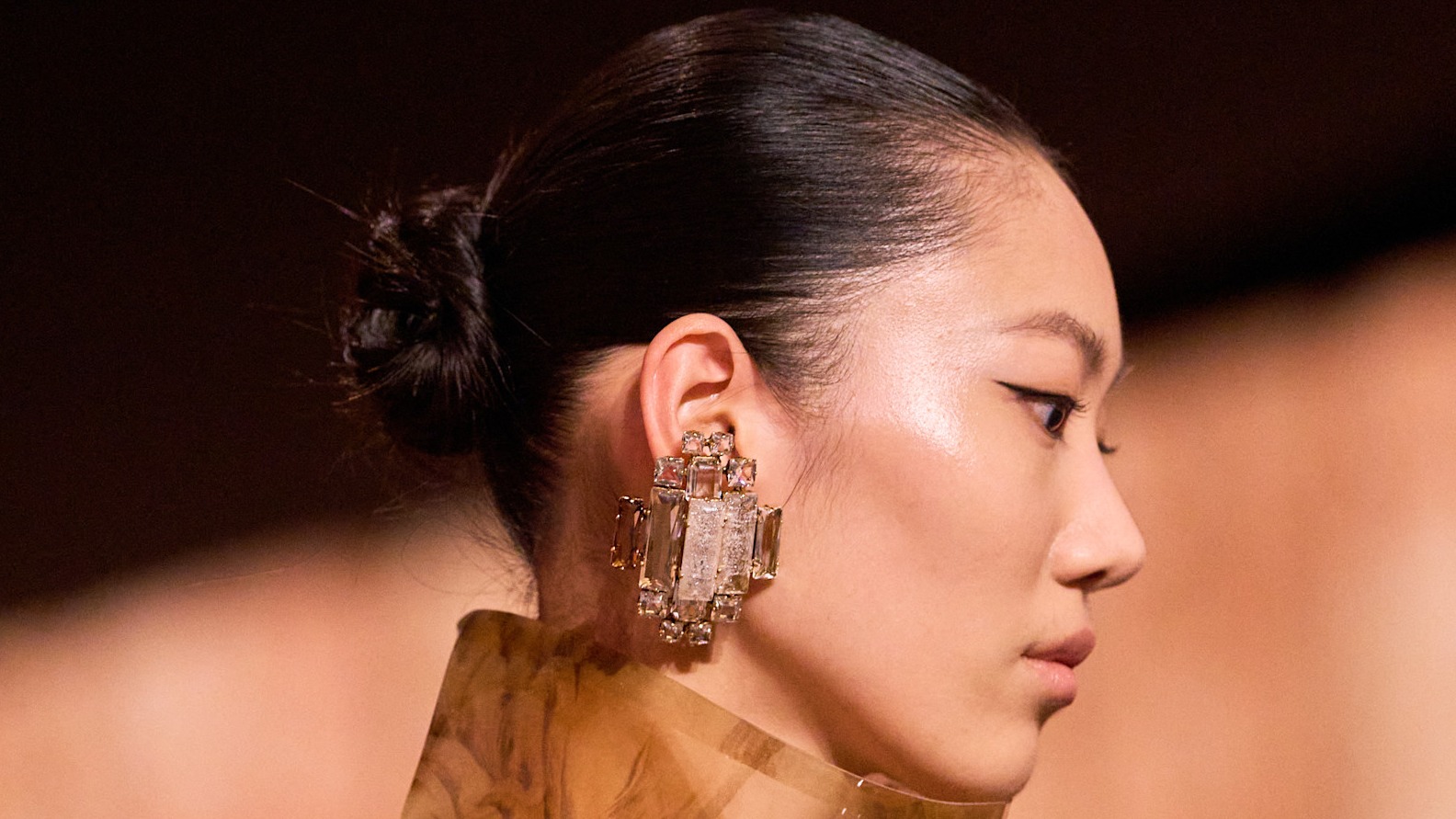
If you’ve ever spent a day in the sun or had to deal with a scar from an unwanted pimple, it’s pretty likely you’ve had a dark spot to contend with. Welcome to the club! Between post-inflammatory hyperpigmentation, melasma, sun spots, age spots, and more, dark spots crop up on nearly anyone and everyone. While these are not necessarily permanent and can fade over time with some lifestyle changes (always apply sunscreen), the best dark spot correctors can help speed up the process.
"A dark spot corrector is like a metal detector for your skin—it finds areas of hyperpigmentation or uneven tone and gradually works to correct them," says board-certified dermatologist Mona Gohara, MD. "These products target the overproduction of melanin that results from sun damage, acne, or hormonal shifts." But how, exactly, do these products work?
“Skincare products can contain ingredients that work in various ways to mitigate the skin producing a darker pigment,” explains board-certified dermatologist Nava Greenfield, MD. "Depending on the formula, they may slow melanin production, accelerate cell turnover to fade existing pigment, or disrupt the signals that trigger new pigment formation." Ingredients range from prescription-level retinoids to over-the-counter options like vitamin C, licorice root, and more.
If you’re not quite sure where to start, start here—and consult with your board-certified dermatologist. From dermatologist-recommended moisturizers to editor-approved brightening serums and concentrates, these products are proven to deliver luminous, more even-toned skin.
The Best Dark Spot Correctors
- Best Dark Spot Corrector Overall: SkinMedica Even & Correct Dark Spot Cream
- Best Value Dark Spot Corrector: Neutrogena Rapid Tone Repair Retinol + Vitamin C Dark Spot Corrector
- Best Moisturizing Dark Spot Corrector: Avène Retrinal 0.1 Intensive Multi-Corrective Cream
- Best Dark Spot Corrector for All Skin Tones: La Roche-Posay Mela B3 Serum Dark Spot Corrector
- Best Dark Spot Corrector Treatment: Dr. Dennis Gross Skincare Alpha Beta Universal Daily Peel Pads
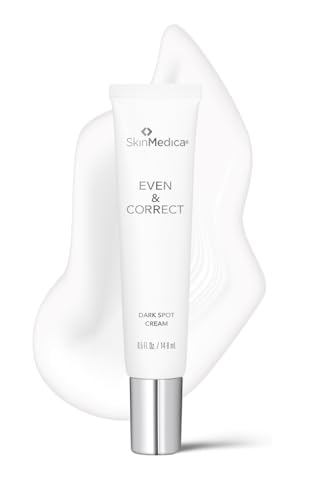
Hyperpigmenation, melasma, you name it—dark spots will be no match for this powerhouse cream. The luxe formula smooths easily onto skin and features tranexamic acid, niacinamide, and marine extracts, says Dr. Gohara. If you have any pigmentation you've been trying to get rid of to no avail, this may do the trick, as long as you stick to your routine. It's "excellent for stubborn pigment and melasma when used consistently," says Dr. Gohara.
Size: 0.5 oz.
Key Ingredients: Tranexamic acid (brightening); Niacinamide (brightening)
What I Love: Treats stubborn hyperpigmentation; Can be used on arms and other areas of body
What I Don’t: Small bottle
Review for MC: "I like that this applies and spreads nicely and evenly. It's super smooth and silky on my skin and doesn't have any scent. It comes in a small bottle, but a little goes a long way. My skin feels slightly tingly after application, so I can feel it working." — Ann Malzahn
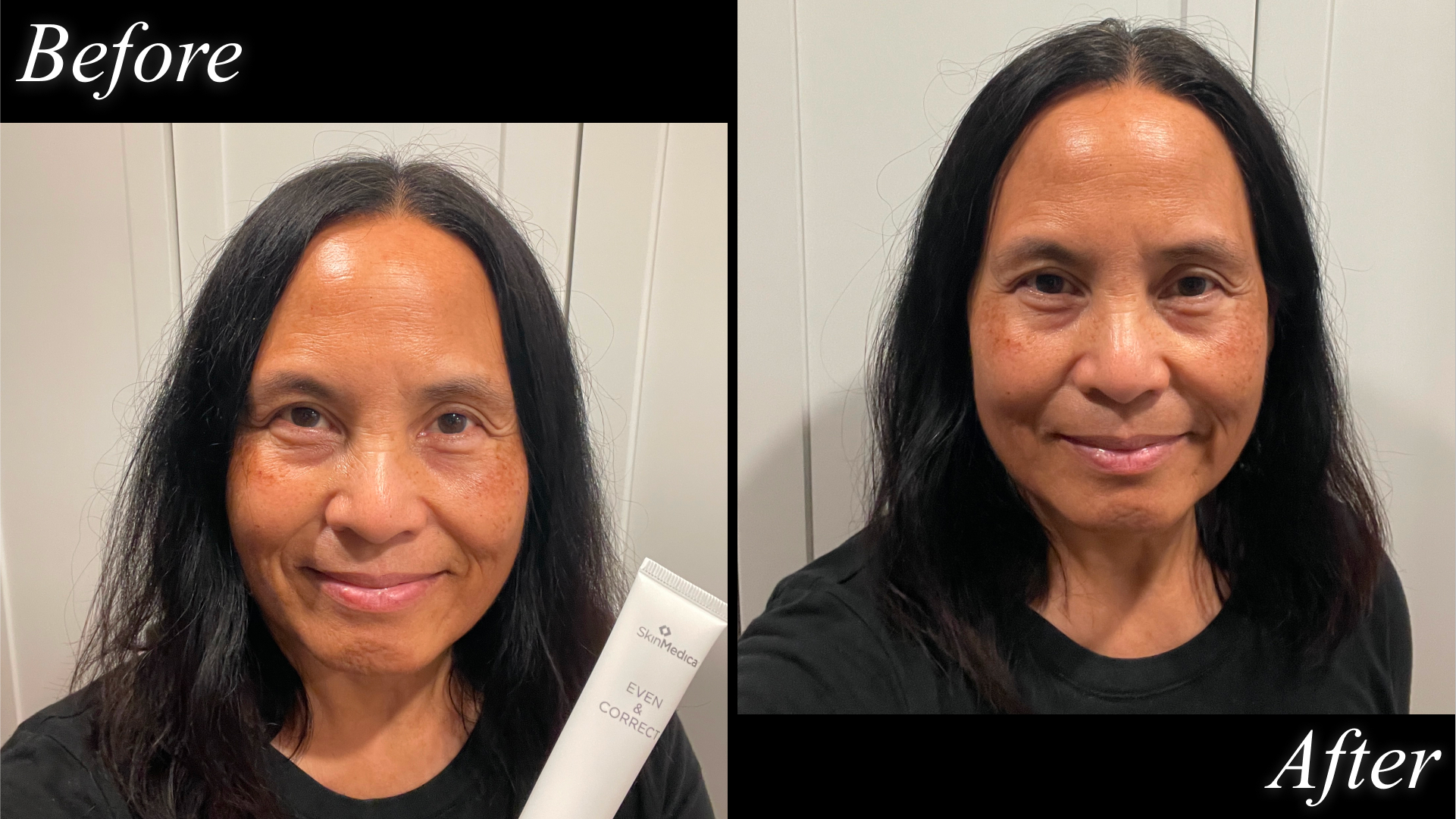
Ann Malzahn testing SkinMedica's Even & Correct Dark Spot Cream.
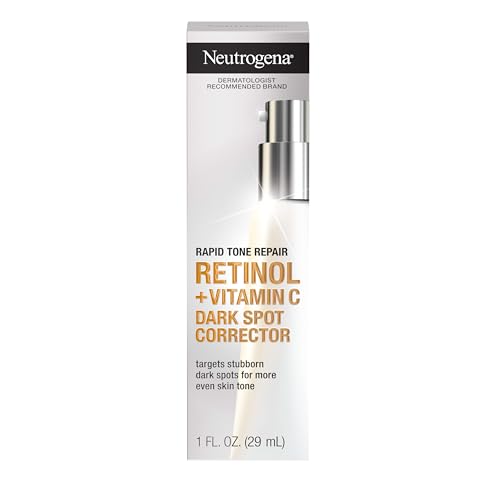
Dr. Gohara recommends this product, calling it a "dependable duo that combines retinol and vitamin C to improve tone and texture without breaking the bank." Pro tip: "Start slow—every other night—and use SPF daily," says Dr. Gohara. It has a light, citrusy scent—no tell-tale stinky vitamin C smell here—and absorbs easily into skin.
Size: 1 oz.
Key Ingredients: Vitamin C (brightening); Retinol (texture-improving)
What I Love: Well-priced; Pleasant scent
What I Don’t: Skin may have a slight reaction upon application
Review for MC: "I can't believe how nice this product smells. It's fresh, citrus-like, and not overpowering. I love that it has both vitamin C and retinol to really brighten and even out my skin tone. I do feel a bit of a warm sensation on my skin when applying it, but nothing very uncomfortable. My skin looks automatically more radiant upon application, and I'm looking forward to more long-term effects." — Catharine Malzahn, Contributing Beauty Writer
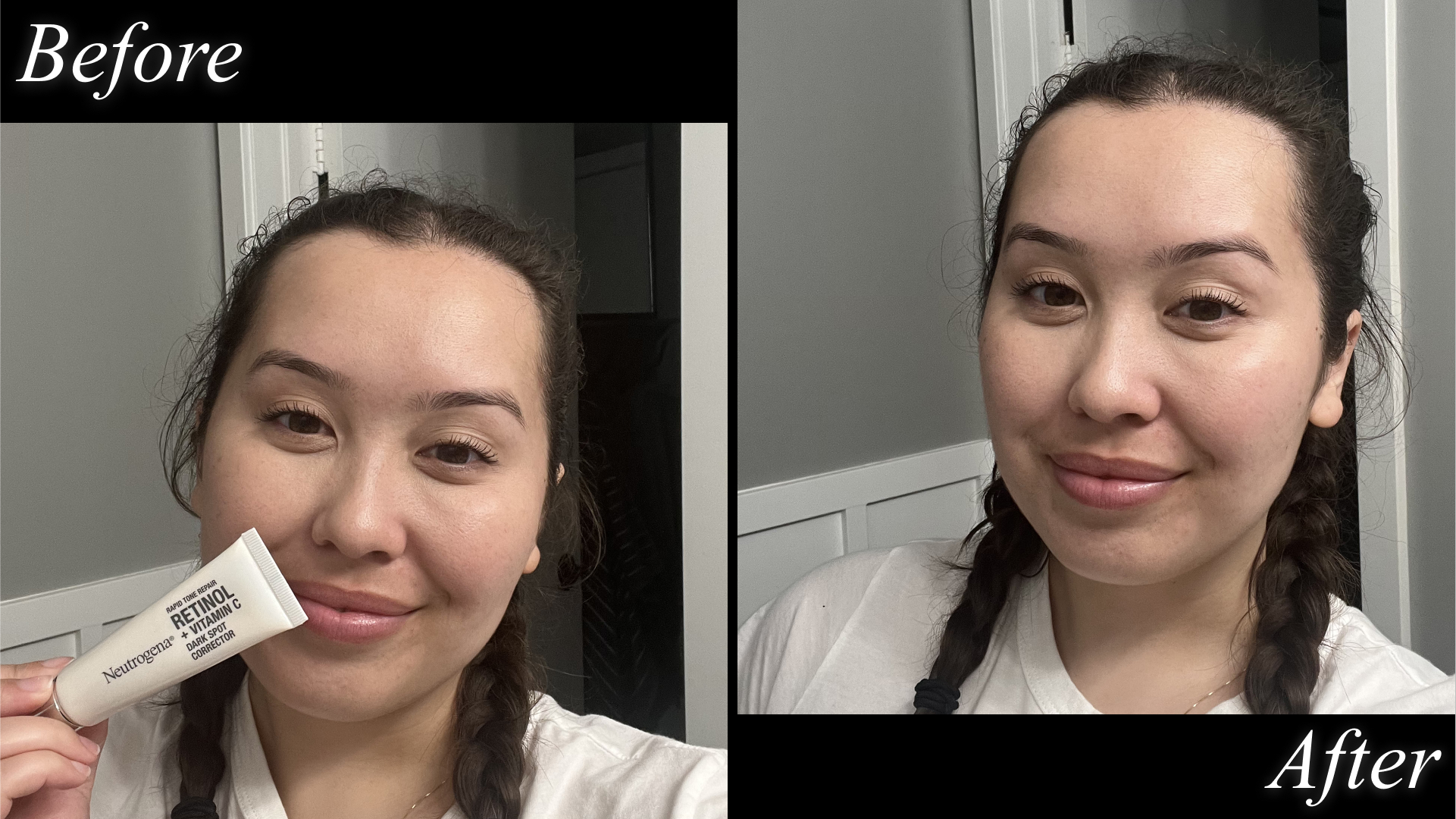
Catharine Malzahn testing Neutrogena's Rapid Tone Repair Retinol + Vitamin C Dark Spot Corrector.
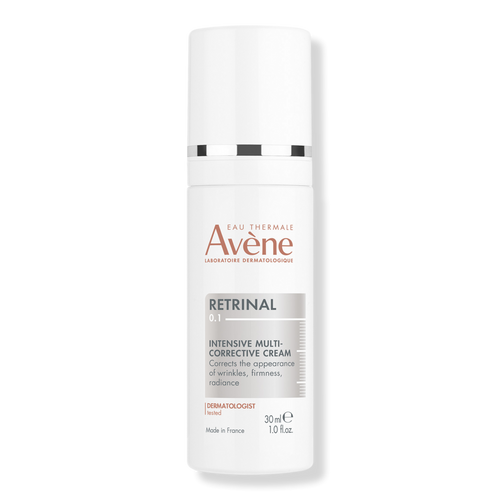
Do you have sensitive skin but still want to treat dark spots? This Avène corrector is for you. Dr Gohara explains that because it's made with "retinaldehyde, a gentle yet effective retinoid that’s ideal for reactive skin," the vitamin A derivative can ease dryness or sensitivity. "It also moisturizes, making it a great two-in-one for nighttime use," she adds.
Size: 1 oz.
Key Ingredients: Retinaldehyde (a form of vitamin A)
What I Love: Moisturizing; Safe for reactive skin
What I Don’t: Smell could be improved
Review for MC: "I like that this comes in an easy-to-use pump that keeps the product hygienic. Though the scent isn't the best, I do like that it's fragrance-free. It hasn't caused me any peeling or redness, and makes my skin look more glowy when I apply it. It moisturizes nicely, so I'm not worried about irritation." — Catharine Malzahn, Contributing Beauty Writer
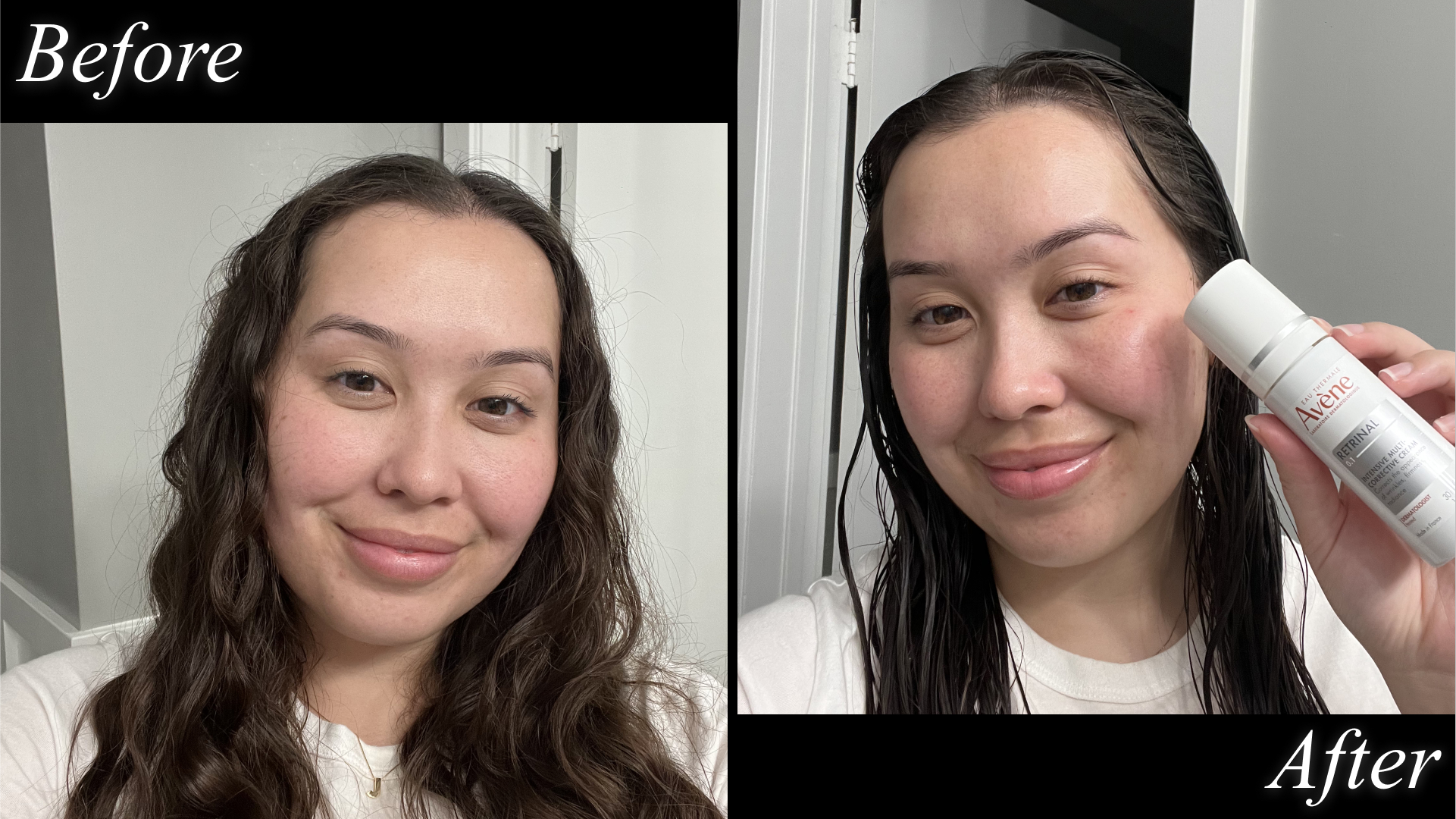
Catharine Malzahn testing Avène's Retrinal 0.1 Intensive Multi-Corrective Cream.
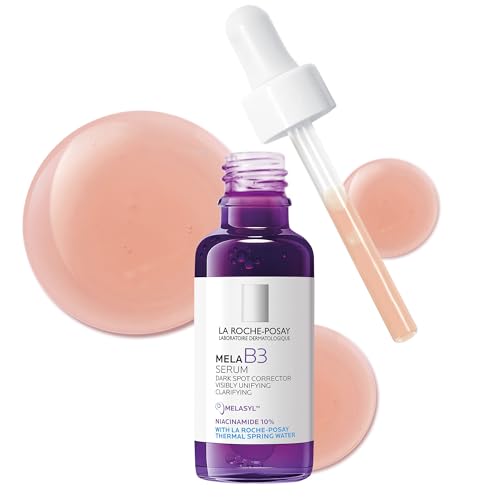
Thanks to the inclusion of La Roche-Posay's famed thermal spring water and niacinamide, you'll get your antioxidant fix with this lightweight dark spot-correcting serum from the French pharmacy brand. Formulated specifically with darker skin tones in mind, it's "safe for all skin tones," says Dr. Lauren Moy, MD, a double board-certified dermatologist and dermatologic surgeon.
Size: 1 oz.
Key Ingredients: Melasyl (targets discoloration); Niacinamide (brightening)
What I Love: Lightweight; Safe for all skin tones
What I Don’t: Dropper can be hard to use
Review for MC: "I like that it has a very light scent, and the serum has a nice light texture. It leaves a bright, radiant finish on my skin and absorbs quickly." — Ann Malzahn
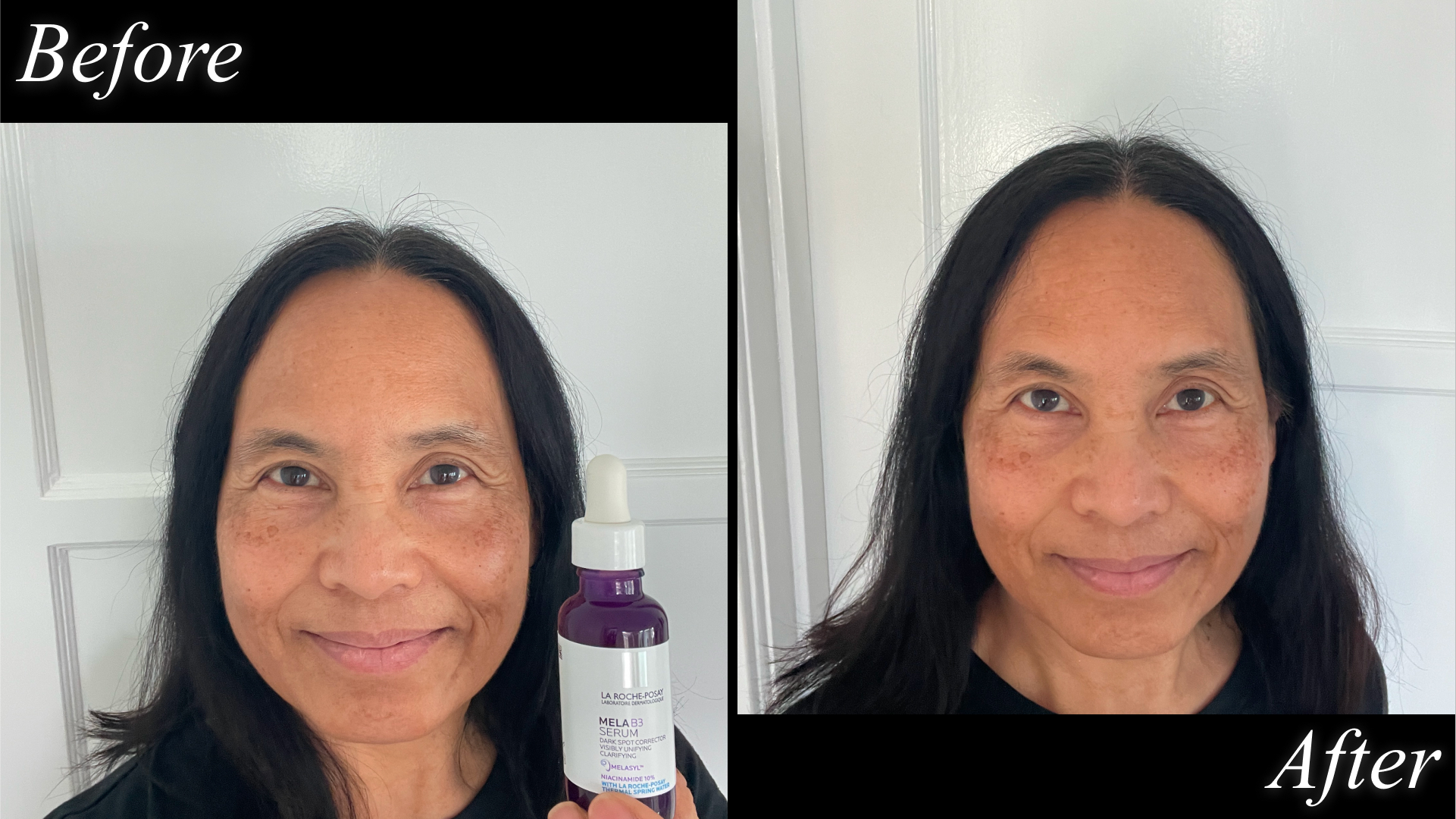
Ann Malzahn testing La Roche-Posay's Mela B3 Serum Dark Spot Corrector.
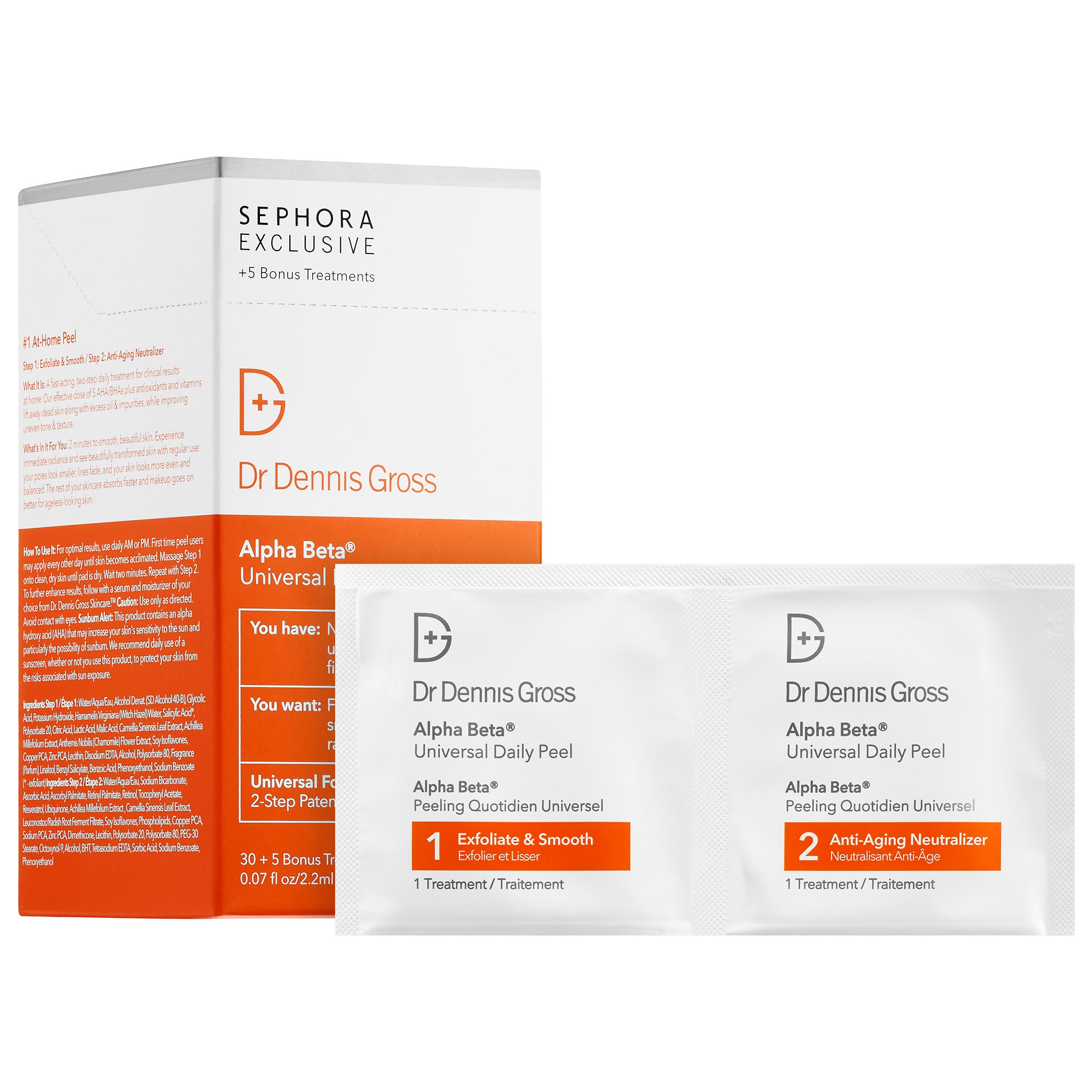
Dermatologist Dr. Dennis Gross is well-known for a variety of hard-hitting skincare products, including this widely-loved Alpha Beta Universal Daily Peel. The two-step at-home chemical peel features a whopping five acids (including both AHAs and BHAs) and 12 antioxidants to deliver results. In a brand-provided daily-use study of 28 participants, 92 percent saw a brighter, firmer, clearer complexion in just one week.
Size: 35 treatments
Key Ingredients: Glycolic acid (AHA); Lactic acid (AHA); Malic acid (AHA); Resveratrol (antioxidant); Green tea extract (antioxidant)
What I Love: Strong, efficacious ingredients; Clinically-backed results
What I Don’t: Must be used as a two-step system
Review for MC: "I've been using these facial pads for 60 days now, and I am truly shocked at the results I've achieved. Four people over the course of three weeks now have told me how great my skin looks. It's even in skin tone and texture, and it hasn't looked this glowy since I was young. I would definitely give this a five-star review." — Maria McTarnaghan
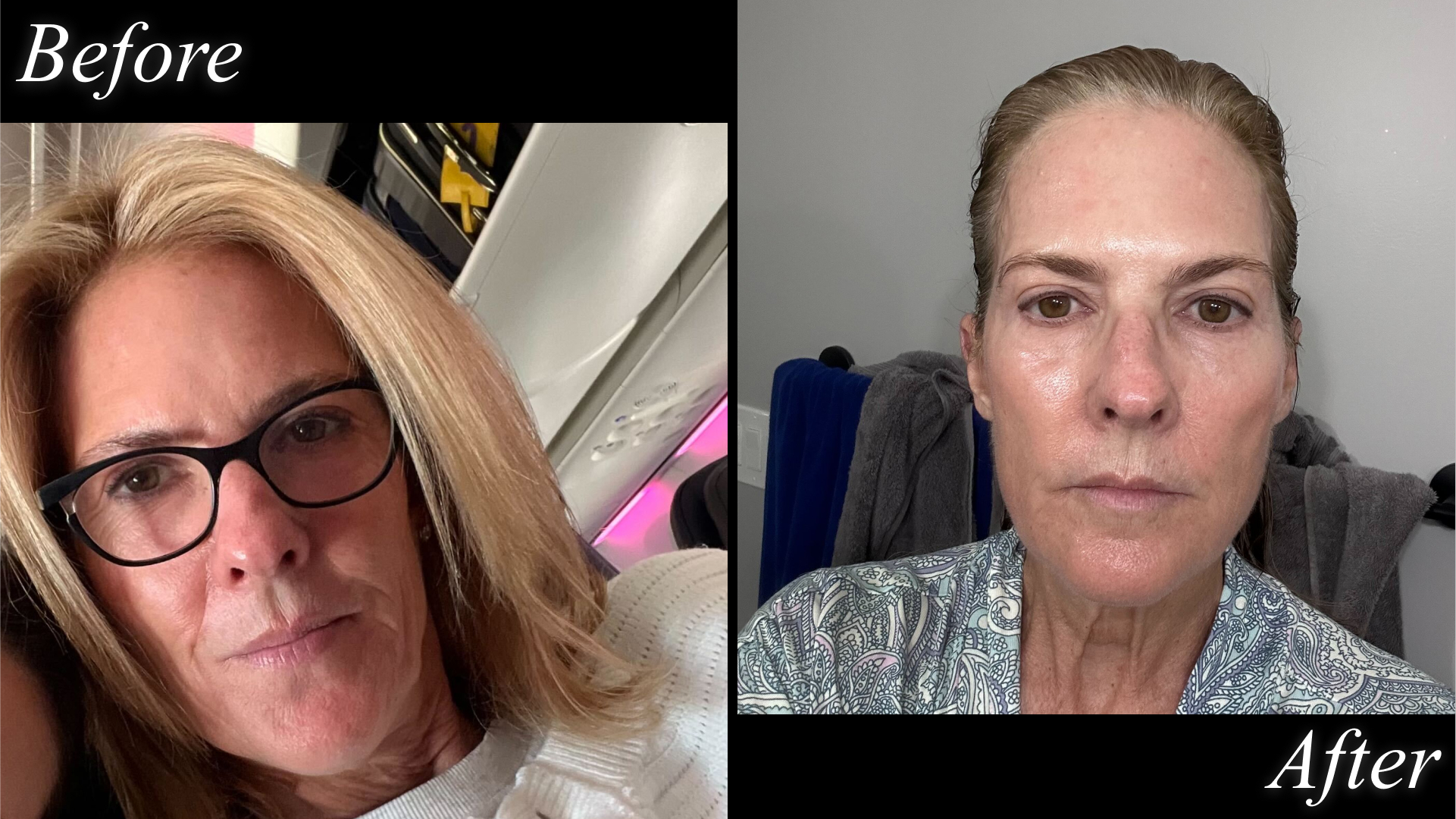
Maria McTargnaghan testing Dr. Dennis Gross' Alpha Beta Universal Peel Pads.
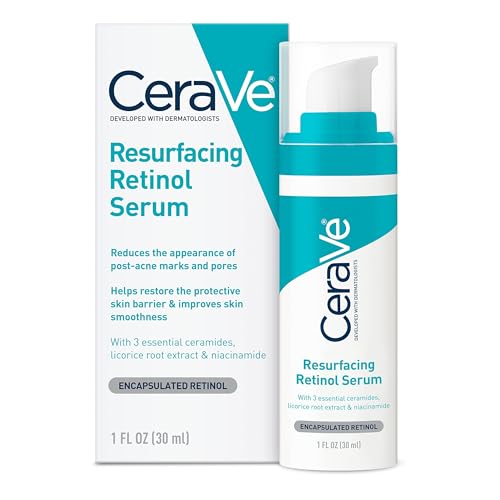
Let's be honest: Some dark spot correctors can be super pricey. CeraVe comes here with an effective yet affordable retinol serum that will treat your pigmentation concerns. It's "less irritating than other retinol products," says Dr. Moy, which is thanks to an encapsulated retinol formula that helps maintain stability and prevent degradation. Plus, with the classic CeraVe inclusion of ceramides, your skin will feel nourished as you apply.
Size: 1 oz.
Key Ingredients: Retinol (treats lines); Niacinamide (brightening); Licorice Root Extract (brightening); Ceramides (soothing)
What I Love: Non-irritating; Multitasking formula treats lines and wrinkles as well
What I Don’t: Skin may experience retinol purging (breakouts) at the start of use
Customer Review: "I've officially been using it for three months, and not only did it literally erase the freckles off of my face, but I no longer have the deep 11 lines between my eyes anymore. Not to mention that when I started using this product, I had terrible breakouts of acne in my T-zone due to hormonal changes related to peri-menopause and for at least the last month, I have not had a single pimple or blackhead anywhere on my face despite having made no changes to my diet, activity level, medications, etc. I did have a long purge period (about 6 weeks), where I had to use blotting papers every couple of hours due to shine, and my breakouts were worse in the first couple of weeks of use." — Amazon
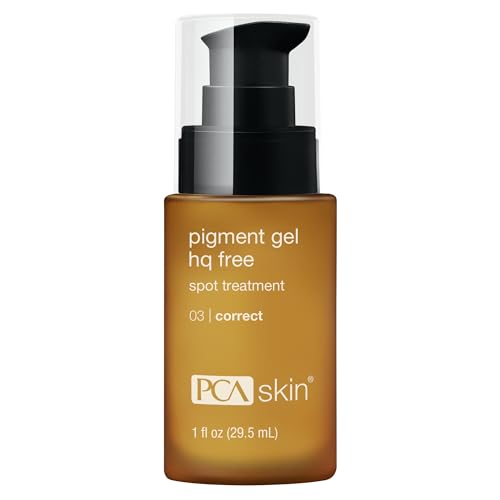
Hydroquinone has long been the gold standard for lightening skin, but it was banned in over-the-counter products by the FDA in 2020 and can cause skin irritation if you get it in a prescription. Rather, turn to this hydroquinone-alternative spot treatment from PCA Skin. It "blends azelaic, kojic, and lactic acids," says Dr. Gohara. It's "great for oily or acne-prone skin and is a smart hydroquinone-free alternative," she adds. Prepare for your skin to slightly peel after you use this (that's just the product at work).
Size: 1 oz.
Key Ingredients: Azelaic acid (promotes a clear complexion); Kojic acid (helps prohibit melanin production); Phenylethyl resorcinol (antioxidant)
What I Love: Acid blend makes it effective for oily skin; Can be tolerated by those who are sensitive to hydroquinone
What I Don’t: Sensitive skin may feel a burning sensation
Customer Review: "I saw improvement on one giant dark spot on my cheek after the first application. Two smaller ones vanished after two weeks and the rest are slowly becoming lighter. I have been using this for four weeks now. Be patient! You only need a tiny bit on each spot. This bottle seems pricey but it will last a very long time! This will slightly burn sensitive or broken skin including active blemishes." — Amazon
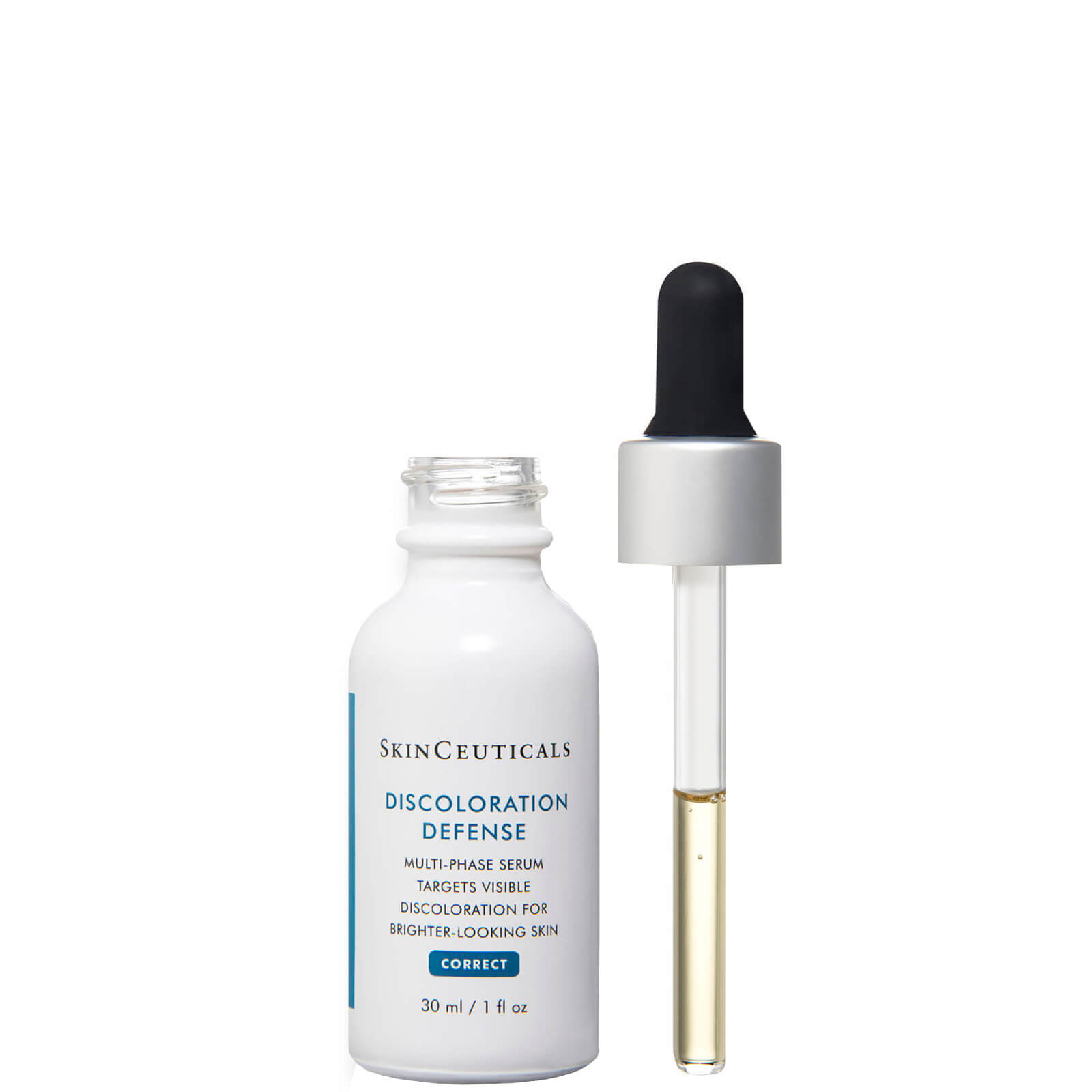
While this derm-approved serum can certainly help with all different kinds of dark spots, it’s especially helpful when it comes to combating brown patches or melasma. It’s a non-hydroquinone brightening serum that leverages the three dark spot-reducing powerhouses: tranexemic acid, kojic acid, and niacinamide. This means it's "pregnancy safe, lightweight, and effective," says Dr. Moy. Each has been shown to minimize the look of brown patches and discoloration, while simultaneously contributing to increased brightness. An added benefit? It’s going to prevent new discoloration from popping up.
Size: 1 oz.
Key Ingredients: Tranexemic acid (brightening); Kojic acid (helps prohibit melanin production); Niacinamide (brightening)
What I Love: Good for melasma; Preventative
What I Don’t: Oily texture
Customer Review: "After being pregnant and having bad hormonal acne, I was left with acne and old acne scars. After a year of now using this product along with other SkinCeuticals products, my face has been restored to pre-baby." — Dermstore
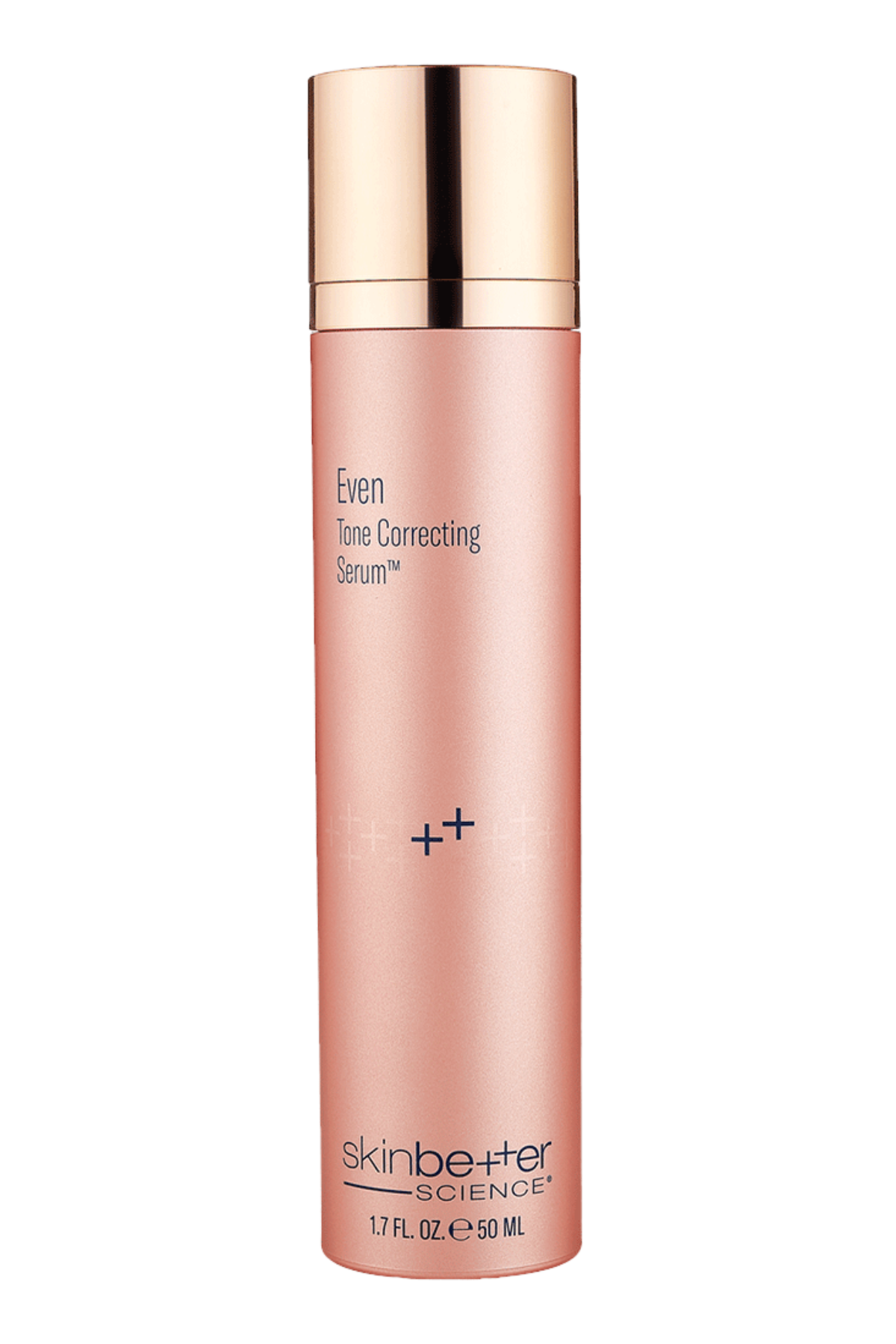
“One of my favorite products for hyperpigmentation right now is SkinBetter Science's Even Tone Correcting Serum,” says board-certified dermatologist Dr. Hadley King, MD. She explains that in addition to notable dark spot-correcting ingredients like arbutin, sodium phytate, diglucosyl gallic acid, hexylresorcinol, acetyl glycyl beta-alanine, and kakadu plum extract, the serum also contains something called mugwort, or artemisia capillaris. “This is high in vitamin A and decreases redness, inflammation, and dullness,” she points out. “I also like that they did a head-to-head study comparing Even Tone with hydroquinone and Even Tone performed as well as hydroquinone in their study.”
Size: 1 oz.
Key Ingredients: Arbutin (evens skin tone); Diglucosyl gallic acid (evens skin tone); Hexylresorcinol (brightening)
What I Love: Derm-approved; Good for inflammation
What I Don’t: Expensive
Customer Review: "Absolutely amazing for pigment, post-inflammatory erythema, and yellow undertones in the skin! Must use consistently AM/PM for at least three to six months! SO GOOD." — SkinBetter Science
Can You Fade Dark Spots Quickly?
Unfortunately, no. Patience and consistency is key here. "Fading hyperpigmentation is a long game—it can take several weeks to a few months, depending on the depth and cause of the discoloration," says Dr. Gohara. Plus, you'll want to be careful when piling on products too quickly. The "powerful ingredients are more irritating and if used too frequently or too much applied, it can make problems worse," says Dr. Moy.
Think of it like fading an old coffee stain from a white shirt, recommends Dr. Gohara: "It requires repetition, the right treatment, and—most importantly—prevention of new stains. That’s why daily sunscreen is crucial," she says.
What Causes Dark Spots?
There’s not one singular cause for dark spots, because there are so many different types of dark spots. “They can come from outside, extrinsic factors such as sun exposure or from internal factors such as hormones,” explains Dr. Greenfield. “Sometimes, dark spots can even result from a combination of both.”
A large portion of dark spots are going to be caused by inflammation. “Some dark spots are post-inflammatory hyperpigmentation. We commonly see this after acne, particularly acne that gets picked, but sometimes acne by itself is inflammatory enough to cause discoloration,” explains Dr. King.
The second major cause is sun exposure, aka the enemy to good skin. The sun, in tandem with hormonal changes and genetic predisposition, can bring about brown or gray-ish patches called melasma. Too much vitamin D can also bring about lentigines, or sun spots, too. “They’re small, pigmented spots on the skin with a clearly defined edge, surrounded by normal-appearing skin,” says Dr. King.
When Can I Expect Results From Dark Spot Correctors?
Word from the wise: give it time. “Use a product for at least three months before you look in the mirror, take before and after photos, and make the determination whether you feel this product has benefited your skin,” says Dr. Greenfield. “Often, you will see a result sooner." So, hang tight, the skin is slow at responding.
What to Look For in a Dark Spot Corrector
Let me put it this way: You have options—and a lot of ‘em. There are so many topical agents that can help brighten skin, even out tone, and fade discoloration. Perhaps the strongest—and most classic—ingredient is something called hydroquinone, which is a lightening agent that can only be used under the care of a dermatologist, given potential side effects, such as mercury exposure.
If you’re going the over-the-counter route, Dr. Greenfield recommends searching for an encapsulated algae complex, which “has demonstrated its ability to prevent the formation of dark spots.” Dr. King also recommends seeking out “retinoids, arbutin, azelaic acid, kojic acid, vitamin C, phytic acid, tranexamic acid, and licorice root.” Some focus on speeding up cellular turnover, while others will provide antioxidant protection and a brightening effect.
Why Trust Marie Claire
For more than 30 years, Marie Claire has been an internationally recognized destination for news, fashion and beauty trends, investigative packages, and more. When it comes to the products Marie Claire recommends, we take your faith in us seriously. Every product that we feature comes personally recommended by a Marie Claire writer or editor, or by an expert we’ve spoken to firsthand.
How We Tested
For this story, Contributing Beauty Writer Catharine Malzahn interviewed multiple dermatologists to get their feedback on what makes a great dark spot corrector and their product recommendations, and then narrowed down the field to the nine best products on the market. When evaluating these dark spot correctors, she took into consideration aspects like texture, scent, efficacy, and more.
Meet the Experts

Dr. Nava Greenfield is a dermatologist practicing at Schweiger Dermatology Group. Dr. Greenfield earned her Bachelor’s Degree from Queens College, City University of New York, where she graduated Cum Laude with honors in mathematics, natural sciences, chemistry and biochemistry. Dr. Greenfield attended medical school at the Albert Einstein College of Medicine, Yeshiva University. She completed her internship at Yale-New Haven Hospital and her residency in dermatology at SUNY Downstate Medical Center. Dr. Greenfield has been published in many medical journals, including The Journal of Dermatological Treatment, the Journal of Women’s Dermatology and Pediatrics. Dr. Greenfield is a member of the American Academy of Dermatology, Alpha Omega Alpha Honor Medical Society, Women’s Dermatologic Society and the American Medical Association.

Hadley King, MD is a board-certified dermatologist who specializes in medical and cosmetic dermatology. She is also a Clinical Instructor of Dermatology at the Weill Medical College of Cornell University. Dr. King graduated magna cum laude from Harvard College with a degree in biochemistry. She received her MD from Columbia University. She trained in medicine at Greenwich Hospital, affiliated with the Yale University School of Medicine, and completed her dermatology residency at the Weill Medical College of Cornell University. After residency, Dr. King worked as an attending physician at Memorial Sloan-Kettering Cancer Center, during which time she specialized in cutaneous oncology and phytodynamic therapy. She also has a background in immunology and her research has been published in a variety of medical journals, including the Journal of the American Medical Association.

Dr. Mona Gohara, a Yale-trained board-certified dermatologist and former chief resident at Yale New Haven Hospital, is an associate clinical professor at Yale, where she continues to teach and mentor. As President of the Women's Dermatologic Society and chair of several committees for the American Academy of Dermatology and the American Society for Dermatologic Surgery, Dr. Gohara is a recognized leader in her field. A trusted medical expert, she frequently contributes to Marie Claire, ELLE, Cosmopolitan, Vogue, and more, and serves on the advisory board for Women's Health. Her clinical focus and interests include skin of color and both medical and surgical dermatology.
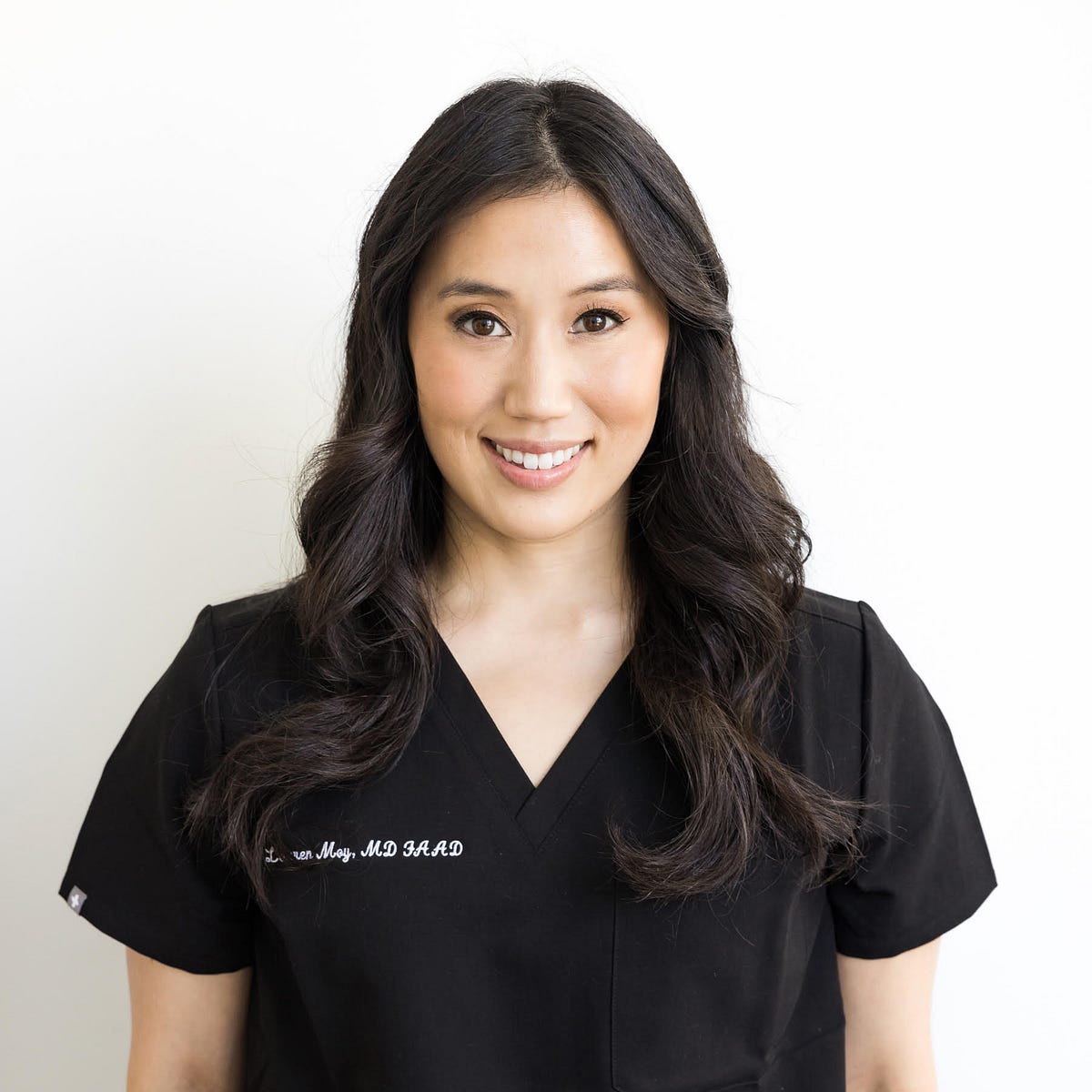
Dr. Moy is a board certified, fellowship-trained dermatologist. Dr. Moy is proud and excited to follow in her world-renowned father Dr. Ronald Moy’s footsteps.
As one of the leading cosmetic and facial plastic surgeons in Los Angeles, Dr. Lauren Moy is also a diplomate of the American Board of Dermatology, American Academy of Facial Plastic and Reconstructive Surgery, American Board of Facial Cosmetic Surgery, and has publications in more than 20 scholarly articles. As a board-certified dermatologist and dermatologic surgeon specializing in Mohs surgery, she also specializes in facial plastic and reconstructive surgery, laser procedures, liposuction, hair loss, and general and cosmetic dermatology.
Following her world-renowned father’s footsteps, Dr. Lauren Moy received her M.D. from Albany Medical College in a combined medical program and completed her dermatology residency at Loyola University where she served as chief resident. She completed her Mohs Surgery and Cosmetic Surgery fellowship at Moy-Fincher-Chipps Facial Plastics and Dermatology, and is board certified as a Mohs surgeon and facial plastic cosmetic surgeon.
Get exclusive access to fashion and beauty trends, hot-off-the-press celebrity news, and more.

Samantha Holender is the Senior Beauty Editor at Marie Claire, where she reports on the best new launches, dives into the science behind skincare, and shares the breakdown on the latest and greatest trends in the beauty space. She's studied up on every ingredient you'll find on INCI list and is constantly in search of the world's glowiest makeup products. She's constantly tracking the biggest nail and hair trends to pop up in the beauty space, going backstage during fashion weeks, tracking celebrity looks, and constantly talking to celebrity hair stylists, nail artists, and makeup artists. Prior to joining the team, she worked as Us Weekly’s Beauty and Style Editor, where she stayed on the pulse of pop culture and broke down celebrity beauty routines, hair transformations, and red carpet looks. Her words have also appeared on Popsugar, Makeup.com, Skincare.com, Delish.com, and Philadelphia Wedding. Samantha also serves as a board member for the American Society of Magazine Editors (ASME). She first joined the organization in 2018, when she worked as an editorial intern at Food Network Magazine and Pioneer Woman Magazine. Samantha has a degree in Journalism and Mass Communications from The George Washington University’s School of Media and Public Affairs. While at GWU, she was a founding member of the school’s HerCampus chapter and served as its President for four years. When she’s not deep in the beauty closet or swatching eyeshadows, you can find her obsessing over Real Housewives and all things Bravo. Keep up with her on Instagram @samholender.

